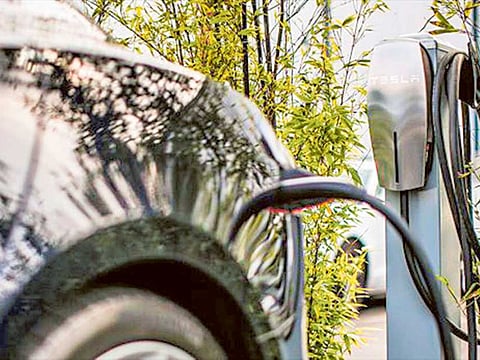Pakistan vows to shift to 30% electric vehicles by 2030
South Asian country shares its ambitious plans on EVs and renewables

Islamabad: Pakistan has announced plans, at an international forum, to shift to 30 per cent electric vehicles by 2030 to switch over to an emission-free future.
The country informed the international community at a virtual meeting of the 32-member UN Group of Friends on Sustainable Energy for All which Pakistan co-chairs along with Norway and Denmark. The group is committed to a transition from fossil fuel to renewable energy.
Ambitious shift
Pakistan’s Ambassador to the UN, Munir Akram, shared the country’s goal to shift towards electric vehicles (EVs) and renewable energy to reduce carbon emissions and mitigate the effects of climate change. “We have an extensive and ambitious plan, both on adaptation and mitigation” to climate change, the ambassador said, adding that Pakistan was committed to meeting the targets set by various international agreements for promoting clean energy. “We are also champions in financing investment in renewable energy”.
Pakistan is among world’s most vulnerable victims of the growing consequences of climate change despite contributing very little to the heat-trapping greenhouse gases. Pakistani envoy asked the major global emitters of harmful gases into the atmosphere to effectively take responsibility for addressing global climate change and to ensure a safe and clean environment for all.
Technology transfer and assistance
Ambassador Akram emphasised the need for the transfer of clean energy technologies to developing countries to help build their capacity. He urged the world’s leading nations to fulfil their pledge and mobilise $100 billion for the annual Green Climate Fund (GCF) for climate action. He said “urgent and immediate actions are needed” to help developing countries achieve their goal of clean environment while recovering from the COVID-19 health crisis.
Switch to e-vehicles
Last year, Pakistan approved its National Electric Vehicles Policy with the aim to ensure that 30 per cent of vehicles on its street will be electric ones by 2030. The government will offer incentives to motorists to switch to EVs.
China’s BYD Auto, the world’s largest electric vehicles manufacturer with a global turnover of $250 billion, has announced plans to enter the Pakistan market. It will facilitate the switch to e-vehicles in the country where Japanese car companies such as Suzuki, Toyota and Honda dominate the automobile sector. Climate Change Adviser Malik Amin Aslam has said electric vehicles will “revolutionise” the transportation industry in Pakistan and reduce the import bill by $2 billion every year. The benefits for the common man are immense, as EVs will help save them fuel and maintenance costs.
Sign up for the Daily Briefing
Get the latest news and updates straight to your inbox







